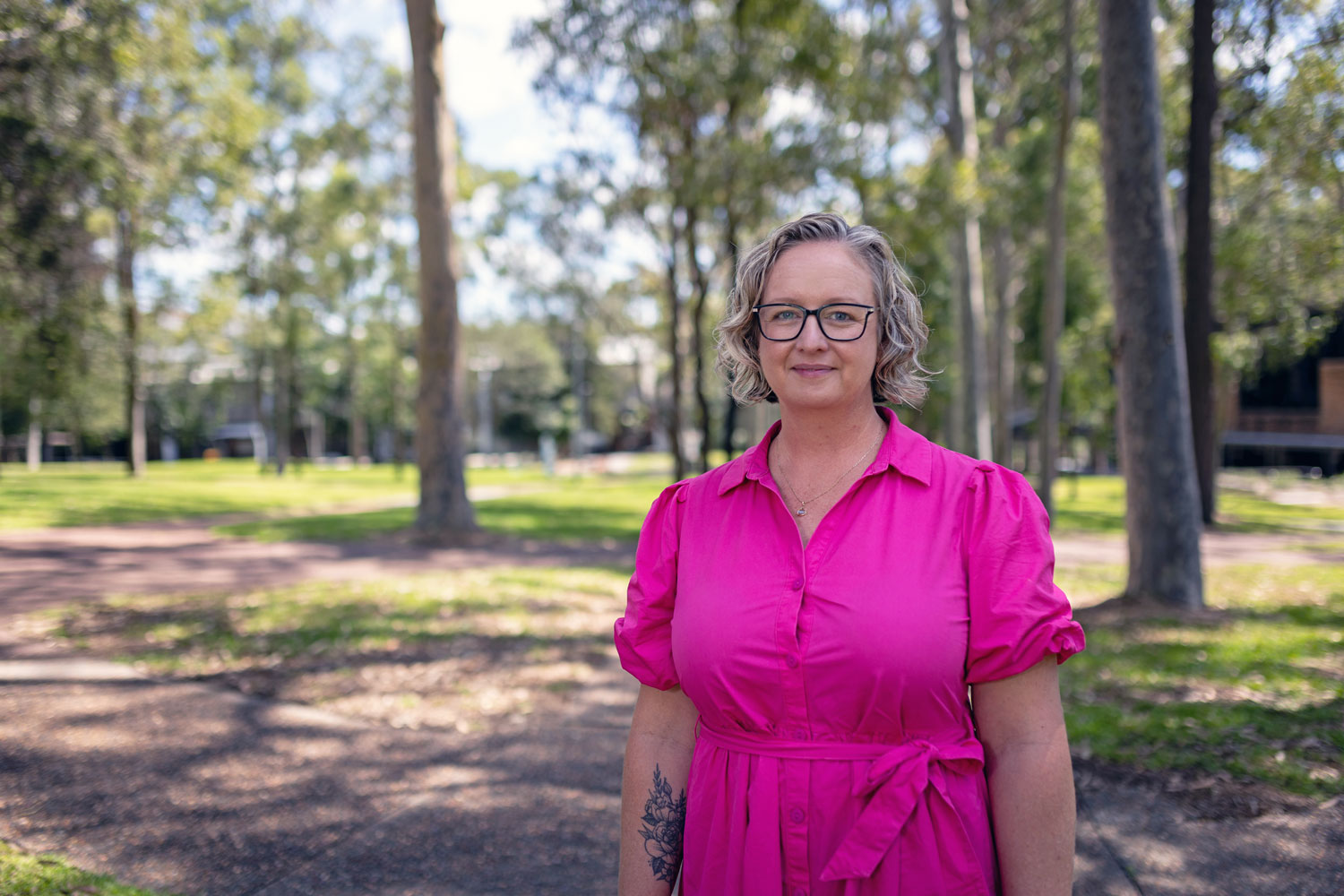Researcher Highlights
Connecting rough-and-tumble play with dad to child development
Dr Emily Freeman
Cognitive/developmental psychology researcher Dr Emily Freeman is passionate about helping parents set their kids up for future success. Her current focus is on sharing the positive developmental impact of ‘roughhousing’ with dad.

Emily began her cognitive and developmental journey right here at the University of Newcastle, where she gained a Bachelor of Science (Psychology) (Hons) and a PhD in cognitive psychology.
Following this, she held post-doctoral positions overseas at Ohio State University in Columbus, USA and then at the University of Adelaide.
Until this point, her research interest had mainly been on memory. But after returning to the University of Newcastle in 2009, her focus switched to the role of parents in child development.
Exploring the parent-child effect
Since returning to the University of Newcastle, Emily has been involved in a number of research projects conducted by the Fathers and Families Research Program at the Family Action Centre.
These projects include looking at the influence of parents on childhood obesity, whether parenting programs are father-inclusive, and if a depressed father can impact a child’s social and emotional development.
It has also led to her current work: the impact of rough-and-tumble play (RTP), particularly father-child RTP, on a child's development.
Rough and tumble comes naturally
Rough-and-tumble play, more commonly called ‘roughhousing’, ‘play fighting’ or ‘rumbling’, is a type of fun, physical play involving wrestling and chasing. It’s something many of us have done as kids—and with our kids.
Interestingly, RTP isn’t only something we humans do, says Emily. It’s also a behaviour seen in almost all mammals, from rodents to bears.
As an example, she asks, “Have you ever sat and watched a litter of puppies in their first four to six weeks of life? All they do is eat, sleep, and rough-and-tumble play.
She goes on to say that the fact that this behaviour isn’t species-specific suggests it plays a functional role in development. Enter her research.
The reason for the focus on father-child RTP on child development is because kids preferentially love to roughhouse with dad.
The developmental pros of RTP play
Through her projects and collaborations with national and international researchers, Emily has found that rough-and-tumble play offers many development benefits to children.
The first is physical development. As children fight, wrestle, and roll around on the floor with a sibling or parent, they develop balance, strength, coordination, and agility. Kids who do it frequently lower their injury risk as they learn their physical limits.
She has also shown that rough-and-tumble play helps children develop their nonverbal communication skills through the need to negotiate and cooperate. They learn to set and respect boundaries and also how to read body language and facial expressions.
On top of this, she’s found that wrestling with siblings and parents helps kids manage and regulate their emotions.
“Just think of all the emotions they feel as they play: excitement, frustration, bonding, fear. Experiencing all these builds emotional resilience.”
Quality of play matters
Importantly, the quality of the play matters.
“To see the benefits, rough-and-tumble play must be frequent, challenging, warm and exciting,” says Emily.
“What we’ve found is that rough-and-tumble play that’s frequent, challenging, warm and exciting, and shares wins and losses, is associated with increased prosocial behaviour, fewer emotional and behavioural problems and even improved working memory in pre-school aged children.”
The challenges: dads and dollars
The biggest challenge Emily has always had in her research is recruiting dads to participate in the studies. In fact, this challenge has led to a whole other arm of research looking at how to encourage dads to get involved in parenting studies.
“We’ve been running studies asking dads what sorts of things they’re interested in participating in because we know from the research that we have done that the father-child relationship is really important for children’s development,” she says.
If they can find out what dads are willing to get involved in, they can expand their work and further develop their existing findings.
Another major challenge is funding, as it is for many researchers. So far, most of her studies are run with tiny budgets. However, because it’s such a fun and important area, she enjoys lots of support from student researchers.
Promoting the role of the male parent
The crucial next step in her academic work is getting her findings out into the world—and this is starting to happen.
Already, more people are talking about rough-and-tumble play. Emily shares that she often has people nationally and internationally asking her to comment on RTP and how it impacts child development.
To date, she has been involved in writing articles for various publications, including The Conversation, and giving many interviews to journalists.
“What I would like, and hope that my research is doing, is helping to show dads that the play they’re naturally drawn to do with their kids isn’t just fun. It’s actually teaching children lots of important skills they don’t necessarily get from other activities,” says Emily.
If dads know that rough-and-tumble play is important for children’s development and developing a strong father-child relationship, they’re hopefully much more likely to do it—and do it more often.
In a world where dads often get overlooked, her research is helping to show that they’re important, too, creating a new space in the parenting field.
The University of Newcastle acknowledges the traditional custodians of the lands within our footprint areas: Awabakal, Darkinjung, Biripai, Worimi, Wonnarua, and Eora Nations. We also pay respect to the wisdom of our Elders past and present.
